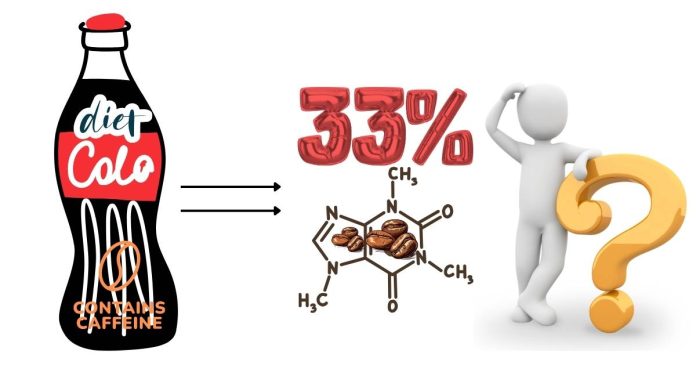If you’re a fan of cola, you’ve probably noticed that different versions of Coke taste slightly different, but what about the caffeine content? A common claim is that Diet Coke has 33% more caffeine than regular Coke. But is this true? Let’s dive into the facts and science behind these beverages to determine how they compare when it comes to caffeine levels.
Caffeine Content in Regular Coke and Diet Coke
Here’s a breakdown of the caffeine content in an average 12-ounce (355ml) can of each beverage:
- Regular Coke: ~34 mg of caffeine
- Diet Coke: ~46 mg of caffeine
When you do the math, Diet Coke contains approximately 35% more caffeine than regular Coke—close to the claimed 33% difference. This makes Diet Coke the go-to choice for those looking for a slightly bigger caffeine boost without reaching for coffee or energy drinks.
Why Does Diet Coke Have More Caffeine?
The difference in caffeine content boils down to taste formulation and target audience.
- Flavor Profile:
Caffeine has a naturally bitter taste. In Diet Coke, which uses artificial sweeteners like aspartame or sucralose instead of sugar, more caffeine is added to balance out the sweetness and create a more robust flavor. Regular Coke, with its sugary base, doesn’t rely as heavily on caffeine for its taste. - Target Demographic:
When Diet Coke was introduced in 1982, it was marketed heavily to adults who wanted a calorie-free soda alternative. Adults, particularly those who drink coffee, tend to have a higher tolerance for caffeine and often appreciate the added stimulation. The higher caffeine content in Diet Coke aligns with this preference.
Caffeine Compared to Other Drinks
While Diet Coke may have more caffeine than regular Coke, its caffeine content is still much lower than coffee and energy drinks. Here’s how it stacks up:
- Diet Coke (12 oz): 46 mg
- Regular Coke (12 oz): 34 mg
- Pepsi (12 oz): 38 mg
- Mountain Dew (12 oz): 54 mg
- Black Coffee (8 oz): ~95 mg
- Energy Drinks (8-12 oz): 80–150 mg (varies by brand)
For those sensitive to caffeine, the extra 12 mg in Diet Coke compared to regular Coke might make a noticeable difference. However, for most people, it’s still far less than a cup of coffee.
Should You Be Concerned About the Extra Caffeine?
The FDA recommends that most adults limit their daily caffeine intake to 400 mg per day. With this guideline in mind:
- You’d need to drink over 8 cans of Diet Coke or nearly 12 cans of regular Coke to hit the 400 mg limit.
- For children and those sensitive to caffeine, even the smaller amounts in regular Coke or Diet Coke could lead to jitters or disrupted sleep.
The extra caffeine in Diet Coke is unlikely to cause issues for the average adult unless consumed in excessive quantities.
Taste and Personal Preference
Caffeine content aside, many consumers choose between Diet Coke and regular Coke based on taste preferences and dietary goals. Some prefer the sweetness of regular Coke, while others opt for Diet Coke’s calorie-free formula. If caffeine levels are a deciding factor, Diet Coke gives you a slight edge for that extra pick-me-up.
Yes, Diet Coke does have about 33–35% more caffeine than regular Coke, making it a slightly stronger option if you’re looking for a mild energy boost. However, the difference is relatively small compared to coffee or energy drinks. Whether you reach for Diet Coke or regular Coke likely depends more on taste and lifestyle choices than caffeine content.
So next time you’re deciding between the two, consider whether you’re after a sugar hit, calorie-free refreshment, or just a little more caffeine to keep you going!
Do you prefer regular Coke or Diet Coke? Share your thoughts below!



